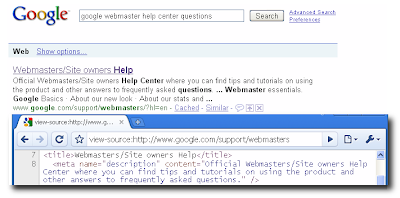Senin, 21 September 2009
Baru-baru ini kami menerima beberapa pertanyaan tentang cara Google menggunakan (atau lebih tepatnya, tidak menggunakan) tag meta
keywords dalam menentukan peringkat hasil penelusuran web. Misalkan ada dua pemilik situs,
Alice dan Bob. Alice menjalankan perusahaan bernama AliceCo dan Bob menjalankan BobCo. Suatu hari saat melihat
situs milik Bob, Alice melihat ternyata Bob telah menyalin beberapa kata yang dia gunakan dalam
tag meta keywords miliknya. Menariknya lagi, Bob telah menambahkan kata "AliceCo" ke
tag meta keywords miliknya. Haruskah Alice khawatir?
Setidaknya untuk hasil penelusuran web Google saat ini (September 2009), jawabannya tidak. Google
tidak menggunakan tag meta keywords dalam menentukan peringkat penelusuran web kami. Video ini memberi penjelasan
lebih lanjut, atau lihat pertanyaan di bawah.
Apakah Google pernah menggunakan tag meta keywords dalam menentukan peringkat penelusuran webnya?
Singkatnya, tidak. Google memang menjual Google Search Appliance, dan produk tersebut memiliki
kemampuan untuk mencocokkan tag meta,
yang dapat mencakup tag meta keywords. Namun, ini
adalah alat penelusuran perusahaan yang benar-benar terpisah dari penelusuran web utama kami. Penelusuran web kami
(penelusuran terkenal di Google.com yang digunakan oleh ratusan juta orang setiap hari) sepenuhnya
mengabaikan tag meta keywords. Saat ini, tag tersebut sama sekali tidak memengaruhi peringkat penelusuran kami.
Mengapa Google tidak menggunakan tag meta keywords?
Sekitar satu dekade yang lalu, mesin telusur menilai halaman hanya berdasarkan kontennya, bukan
faktor yang disebut "di luar halaman" seperti link yang mengarah ke halaman tersebut. Pada waktu itu, tag meta
kata kunci dengan cepat menjadi area tempat seseorang dapat memasukkan kata kunci yang sering kali tidak relevan dan pengunjung
biasanya tidak pernah melihat kata kunci tersebut. Karena tag meta keywords sering disalahgunakan,
bertahun-tahun yang lalu Google mulai mengabaikan tag meta keywords.
Apakah ini artinya Google mengabaikan semua tag meta?
Tidak, Google masih menggunakan beberapa tag meta lain. Halaman
tag meta ini mendokumentasikan info lebih lanjut
tentang beberapa tag meta yang masih kami gunakan. Misalnya, terkadang kami menggunakan tag meta description
sebagai teks untuk cuplikan hasil penelusuran kami, seperti yang terlihat di screenshot ini:

Meskipun terkadang kami menggunakan tag meta description untuk menampilkan cuplikan, kami
tetap tidak menggunakan tag meta description di peringkat kami.
Apakah ini berarti Google akan selalu mengabaikan tag meta keywords?
Google mungkin dapat menggunakan informasi ini pada masa mendatang, tetapi kemungkinannya kecil. Google telah
mengabaikan tag meta keywords selama bertahun-tahun
dan saat ini kami tidak perlu mengubah kebijakan tersebut.
